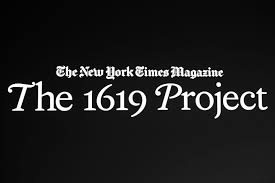
I suppose that it is long since past the time to listen to the 1619 Project published by the New York Times Magazine. And now with #BlackLivesMatter all in the news, it is more important than ever to to take the time and see what the project is and what it says.
But before I do, I want to take a few minutes and collect my thoughts and write down what I think of the 1619 before I listen to the podcast found here.
The first African slave ship to arrive in what is now America landed in the year 1619. With the arrival of that ship, the practice of chattel slavery in what would become the United States of America began. As I understand it, the 1619 project is an attempt to correct the historical accounting of the founding of the nation more commonly taught as an experiment in liberty and freedom. The author, Nikole Hannah-Jones, tries to tell the story of America through the lens of the oppression of people, I assume this would be non-white people, and how that oppression was used to build the the United States. I expect that Nikole will make the case that this country, the wealth and prosperity it has enjoyed, is due in no small part to the forced labor and the abuse of minority people at the hands of white Europeans and it is this narrative, rather than the idea that we are founded on near religious documents such as The Declaration of the United States of America and The Constitution of the United States of America, that is the true story of our beginnings.
If you know me, you will not be surprised to learn that I take a very skeptical side-eye to this idea. It’s not that I deny the fact that slavery existed in America, that slavery is brutal and inhumane, that the legacy of slavery still echos today. I don’t deny any of that. I just don’t happen to feel that America was founded on the concepts of being a slave state. I happen to feel that America was founded on the concepts stated in those documents. Concepts such as negative rights, limited government, the sovereignty of the individual. I believe that the founders did envision “a more perfect union” when they were gathering and thinking and legislating.
I have a healthy suspicion of the NY Times, its reporters, their bias. I don’t believe that they are neutral observers reporting news and facts as they happen and leave the analysis to us, the gentle reader. Rather, the Times has an agenda and that agenda is more closely aligned with far left ideology, think Karl Marx, than an ideology based on the concept of individual liberty. With this in mind, I fully expect that my listening of the 1619 Project will find errors in facts, a rewrite of history to support a “going in narrative” and an arc meant to reinforce a policy agenda already formed rather than an honest curiosity driven questioning of events years gone by.
To be fair, I listen to a majority of opinion from the right. I listen to Ben Shapiro, The Federalist, CATO. I read Reason and Mises. I also try to balance this with The Slate’s, ‘The Gabfest’ and am a regular reader of Slate and up until they went behind a paywall, The Atlantic. Of my sources of analysis, it is Ben that is the harshest critic of Nikole and her project.
I believe that America is that noble invention. I believe in the nobility of the self and the state that allows the expression of the individual liberty we all ought enjoy. In fact, liberty being the natural state of man, I happen to think that the restriction of that liberty, to deny a man the ability to express fully his own liberty, is nearly so, more so, a sin against nature as it would be to take his life.
I believe that we are all members of humanity; a humanity that itself an best be described as a ‘fallen humanity’. That while we are created in the image of God, we have not, cannot, live up to the expectations of a perfect life. That life, that perfection, is not meant for this world; that is the domain of the next. I believe that man can be wicked, man can be cruel. I find that, in the end, we all strive to make a life for ourselves better and that often, as is our nature, we see the world and the resources in it as a finite pie. We see the struggle for a better life as a zero sum game. Think a sporting contest between two players or teams. A score for your team, or a reduction of a score of your opponent is the same. A touchdown is a 7-point advantage for you and represents an exactly opposite 7-point disadvantage to the opposition.
A zero sum game. A game that ends 21-7 represents a 14-point advantage for your team and a 14-point disadvantage to the other team. Plus 14 for you and minus 14 for them. (+14) + (-14) = zero. A zero sum game.
This belief leads to all forms of evil. Slavery being one. In that regard, the United States is not unique. Slavery has existed since time immemorial and in every society and civilization in the world. In fact, slavery continues today. The noble intentions of our founding should not be replaced or rejected simply because people are sinful, a sad state that we cannot escape, but should be celebrated BECAUSE, or in spite of the fact, that we are sinful. It is the acknowledgement of our failings that is the genesis of our nation.
I suspect that Nikole and 1619 will try to refute that. I suspect that I will not enjoy that argument and will likely reject it as wrong.
